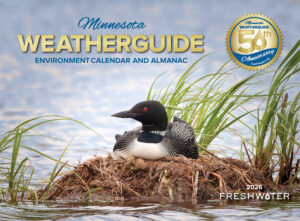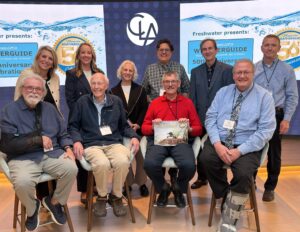We are on a mission to inspire and empower people to value and protect water.
 Freshwater sets priorities for Minnesota legislative session
Freshwater sets priorities for Minnesota legislative session
This year's state legislative session runs February 17 through May 18, and Freshwater will be engaging with policymakers on water issues by offering science-based perspectives and collaborative solutions.
We are working on several priorities at the Minnesota Legislature this session, including: smart design and development of new high-volume water users; water infrastructure funding; and safe drinking water for private well owners.
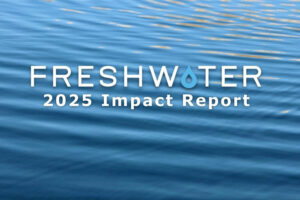 View our 2025 Impact Report
View our 2025 Impact Report
We are excited to share our 2025 Impact Report, a look at the tangible progress we made together last year to inspire and empower people to value and protect water.
Thanks to Freshwater's fantastic network of supporters, 2025 was a year defined by strategic expansion of programs, timely responses to emerging water challenges, and ongoing collaboration across sectors to foster better water outcomes for all.
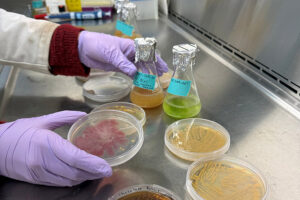 Innovative project harnesses the power of biology to clean up "forever chemicals" in groundwater
Innovative project harnesses the power of biology to clean up "forever chemicals" in groundwater
A bold new effort to address one of Minnesota’s most persistent water challenges is now underway. Freshwater is partnering with Bay West and the University of Minnesota on a 3-year project to develop and test innovative, biofilm-based technologies to destroy PFAS – often called “forever chemicals” – in contaminated groundwater. This project represents an important step toward long-term, science-based solutions to protect Minnesota’s water.
2026 Weatherguide on sale!
Enjoy a 25 percent discount on the 2026 Minnesota Weatherguide Environment Calendar and Almanac, our 50th Anniversary edition.
Published in partnership with KARE 11, Minnesota Public Radio and Jeffers Foundation, the Weatherguide features stunning photography and a wealth of information about the natural world. Plus, your purchase helps support Freshwater's work for water.
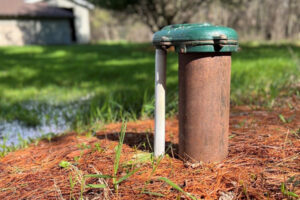 New project tackles arsenic testing in southern Minnesota wells
New project tackles arsenic testing in southern Minnesota wells
Freshwater recently kicked off a new 3-year project in partnership with the Mayo Clinic to test private drinking water wells for arsenic in eight southern Minnesota counties. This pilot project (Rice, Steele, Freeborn, Waseca, Faribault, Blue Earth, Watonwan and Martin counties) approaches well testing with a new lens by partnering with healthcare physicians to educate and encourage residents to test their wells – and by offering free, convenient well testing opportunities.
Celebrating 50 years of Weatherguide: a look back
Freshwater celebrated 50 years of the Weatherguide Calendar and Almanac on October 30th, 2025. The celebration was held at CLA Connect in Eagan and attended by Weatherguide lovers, contributors, and partners alike. We deeply value the partnerships that make this calendar possible, bringing together scientists, educators, news media, artists, and community. Thank you to everyone who supports and contributes to the Weatherguide, especially KARE 11, MPR, and the Jeffers Foundation!
 Freshwater leads regional discussions on data centers and large water users
Freshwater leads regional discussions on data centers and large water users
As the use of artificial intelligence continues to rise, so does the demand for hyperscale data centers, which can use millions of gallons of water each day for cooling. State and local governments are wrestling with how to promote responsible economic development while protecting water supplies for the long term. Freshwater continues to lead regional discussions on smart siting of data centers and high-volume water users through several projects, conference presentations and webinars.
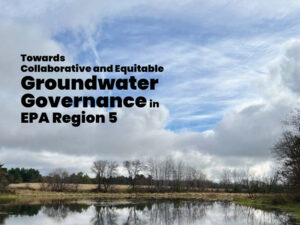 Freshwater releases new report on groundwater governance
Freshwater releases new report on groundwater governance
Freshwater recently published a new report, Towards Collaborative and Equitable Groundwater Governance in EPA Region 5, concluding our second phase of work on groundwater governance funded by The Joyce Foundation.
The report page also includes a series of related topics that the Freshwater team explored during this 18-month project such as treaties, regional and local groundwater governance, and communicating groundwater science.
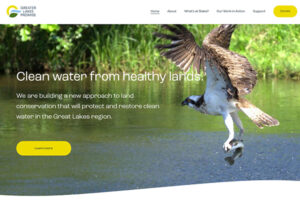 Greater Lakes Promise supports clean water through healthy lands
Greater Lakes Promise supports clean water through healthy lands
Freshwater is leading an innovative partnership for clean water called Greater Lakes Promise. With support from the Great Lakes Protection Fund, the project includes several land trusts collaborating on a regional approach to land protection around the Great Lakes.
Using state-of-the-art watershed modeling paired with local insights, our team selects high priority lands for conservation. These lands are then permanently protected with funding generated by individuals and businesses who live and work in the region.
Freshwater gathers input for Minnesota Drinking Water Action Plan
The Minnesota Department of Health is developing a 10-year action plan to better manage drinking water, and Freshwater played a key role in engaging water professionals and community members.
This work is outlined in two reports: Lessons from Drinking Water Professionals: An Assessment of Drinking Water Governance in Minnesota and Minnesota Drinking Water Action Plan Community Engagement Feedback. These insights will help guide policies to protect drinking water in Minnesota.
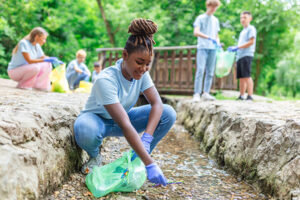 Fight plastic pollution with Adopt a River
Fight plastic pollution with Adopt a River
We invite you to help clean up plastics and other litter around a lakeshore, riverbank or neighborhood street near you.
Check out our Adopt a River toolkit for resources and tips on how to organize a community cleanup. It's easier than you think, and it can make a big difference. Thanks for joining together and helping keep our waters clean!

Water news and resources
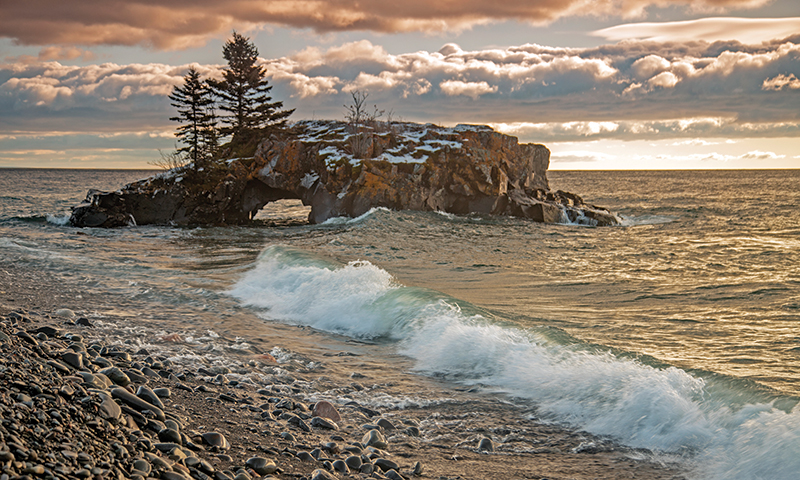
Support Freshwater
Your support is instrumental in protecting the lakes, streams and drinking water we all value.
Invest in the future of clean water with a charitable gift today.
